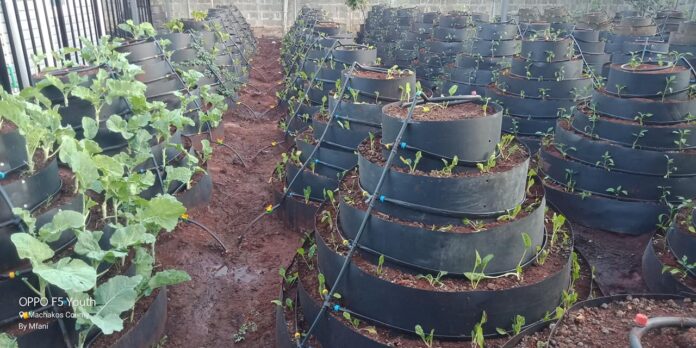The dam liners are gaining popularity in Kenya due to their versatile use and ease of management, with farmers utilizing them to grow vegetables as well as create fish pods.
Dam liners are strong, durable, and long-lasting PVC materials that prevent water loss through seepage into the soil. Farmers are now adopting the materials to construct vertical gardens to boost production in a small space.
The technology is said to be ideal for farmers with little space as the multi-story gardens can accommodate many plants at the same time. It also reduces labour as well as the overall production cost as no weeding is required.
Lucy Makena, a farmer who uses the technology to grow vegetables says when setting up the garden, a farmer needs to establish the diameter using the dam liner, then fill it with soil well-mixed with manure, preferably goat or chicken manure.
“The gardens are made from recycled dam liners, constructing a multi-story garden with five or more layers,” Makena told The Standard.
She explained that the layers decrease in size as they go up to manage the weight of the garden and provide space for the plants to grow.
Inside Nakuru dairy farm that collects over 750 litres of milk every day
According to her, while planting, bulky plants should occupy the bottom layer, while less bulky ones should be placed on the top layers to balance the garden’s weight.
“The garden can be arranged with spinach at the bottom, followed by cabbage, carrots, and onions at the top,” she said.
She notes that the materials are cheap and durable and allow for increased yield in a small space.
“A one-meter by one-meter diameter with a 2.5-meter circumference costs Sh1,500. It can last up to 20 years and support three planting seasons before needing to be rebuilt,” she said.
“A farmer planting spinach or sukuma wiki in one garden can harvest 1,000 pieces, earning Sh500 daily. This is economically sustainable for small-scale farmers with limited space,” she added.
According to her, less water is required, with drip irrigation being the preferred method of irrigation. She encouraged the youth to embrace this technology as a means of earning income.








